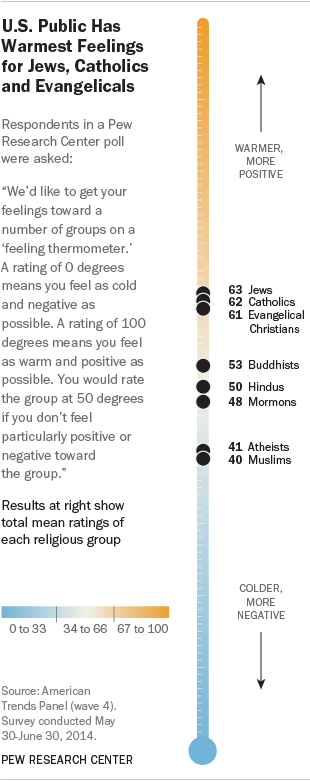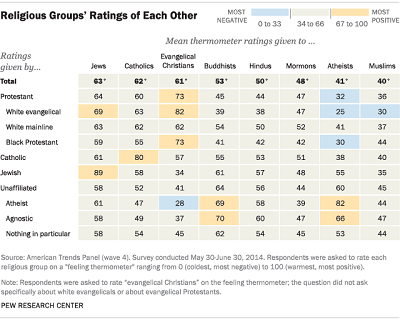Weekly Numbers Report
by Deanna Cantrell
Many nontheists experience some sort of misunderstanding or misconception regarding our way of thinking, lack of belief or code of ethics at least at some point during our lives.┬á Just yesterday, I was contacted by a friend who told me a particularly interesting experience that occurred on Sunday involving a group of JehovahÔÇÖs  Witnesses practicing their mission work.
Witnesses practicing their mission work.
After the first group was turned away by the homeowner, a second group approached my friend who was standing on the porch after they had failed to answer the door a second time.┬á After all, they were worshiping at the temple of Sunday afternoon football.┬á ÔÇ£So someone is homeÔÇØ she said, ÔÇ£Have you heard the good news?ÔÇØ┬á ÔÇ£I am familiar… but I am an atheistÔÇØ he said.┬á ÔÇ£So youÔÇÖre a devil worshiper.ÔÇØ said the Witness. ┬áMuch to my friendÔÇÖs credit, he calmly did set the record straight.┬á Did it change their perception? ┬áNo,┬áhe likely would have a better chance of being struck by lightning than changing their minds.┬á What matters, is that a calm, fact based dialogue was created.
According to a Pew study, members of the same group tend to favor each other the most.  It is simply human bias, we can overcome this natural bias but it is our baseline.  Think of these feelings as degrees on a thermometer, certain groups have been found to be seen as more universally warm, others are given the cold shoulder.
Catholics and evangelical Christians are large groups and viewed each other warmly in this study helps to explain why the two groups are among the most favorably viewed groups in the population. (Catholics account for 20% of the sample in the survey, and self-described evangelical/born-again Christians account for 32% of the sample.) The other groups depicted also represent much smaller percentages of the population at large.
Catholics and evangelicals, the two largest Christian groups measured here, generally view each other warmly. White evangelical Protestants give Catholics an average thermometer rating of 63; Catholics rate evangelicals at 57. Evangelicals also hold very positive views of Jews, with white evangelical Protestants giving Jews an average thermometer rating of 69. Only Jews themselves rate Jews more warmly.
Though this warmth does not go both ways: despite evangelicalsÔÇÖ warm rating toward Jews, Jews in the study gave evangelicals a much cooler rating (34 on average).┬á When asked about other non-Christian groups, evangelicals tend to express more negative views. White evangelicals assign Buddhists an average rating of 39, Hindus 38, Muslims 30 and non-theists 25.
The low ratings between evangelicals and non-theists are reciprocal. Nontheists give evangelical Christians a cold rating of 28 on average.  Nontheists gave relatively toasty numbers to several non-Christian religious groups, including Buddhists (who receive an average rating of 69 from atheists), Jews (61) and Hindus (58). Though, non-theists polled were inclined to give much cooler ratings to Muslims and the Christian groups asked about in the survey.
This survey does not list reasons for bias, or why certain groups were viewed more negatively than others.  What it does show is that room for improvement is evident in all groups.  What we can do is strive to bridge the gap.
If the clash between theism and nontheism were merely about metaphysical ideas, personal choices, or even quests made by consenting adults, then it should indeed be a negotiable difference in societies which allow for many other kinds of diversity.┬á┬áIt is striking that the most intractable disputes between believers and nonbelievers concern the treatment of┬áchildren: how and by whom they should be raised; what they should be taught about the origin of the world; whether, in the name of religious custom…With or without the guidance of brainy public intellectuals, these are hard-arguments which lead to hard choices.
In 2008, in the Illinois House of Representatives, Representative Monique Davis (D-ChicagoÔÇöwhom still occupies a seat) had choice words regarding non-theists and children during a committee hearing about the ÔÇ£moment of silenceÔÇØ observed in Illinois public schools.┬á Rob Sherman, an activist of Buffalo Grove, a Chicago suburb, testified before the House State Government Administration Committee.
IÔÇÖm trying to understand the philosophy that you want to spread in the state of Illinois. This is the Land of Lincoln…where people believe in God, where people believe in protecting their children.ÔǪ What you have to spew and spread is extremely dangerous, itÔÇÖs dangerous… to the progression of this state. And itÔÇÖs dangerous for our children to even know that your philosophy exists! Now you will go to court to fight kids to have the opportunity to be quiet for a minute…I am fed up! Get out of that seat!┬á You have no right to be here! We believe in something. You believe in destroying! You believe in destroying what this state was built upon.
 ┬áMs. DavisÔÇÖ views sum up the problem quite well.┬á In the words of Abraham Lincoln, who called Illinois his home and went on to become the United StateÔÇÖs 16th president, ÔÇ£Let us at all times remember that all American citizens are brothers of a common country, and should dwell together in the bonds of fraternal feeling.ÔÇØ –November 20, 1860 Remarks at Springfield, Illinois.┬á This statement does not just apply to the U.S., for we are citizens of a global nation.┬á We can live among one another, as free thinkers we should be instrumental in leading the way.┬á Impacting positive change and bridging the gap, no more giving each other the cold shoulder.
┬áMs. DavisÔÇÖ views sum up the problem quite well.┬á In the words of Abraham Lincoln, who called Illinois his home and went on to become the United StateÔÇÖs 16th president, ÔÇ£Let us at all times remember that all American citizens are brothers of a common country, and should dwell together in the bonds of fraternal feeling.ÔÇØ –November 20, 1860 Remarks at Springfield, Illinois.┬á This statement does not just apply to the U.S., for we are citizens of a global nation.┬á We can live among one another, as free thinkers we should be instrumental in leading the way.┬á Impacting positive change and bridging the gap, no more giving each other the cold shoulder.
